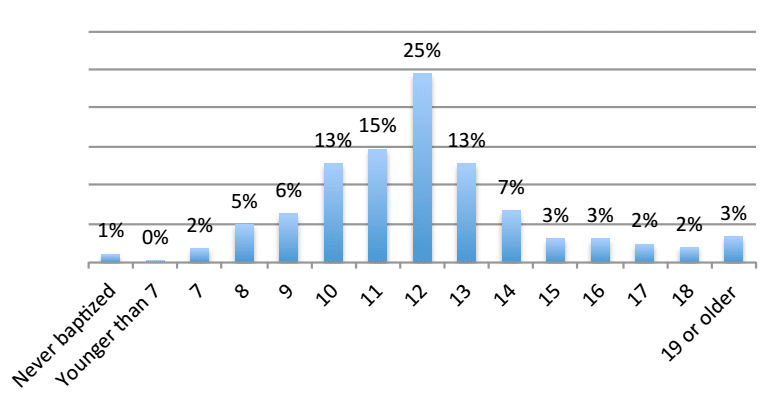If you were asked to recall the pinnacle of your walk with Christ – the moment your heart was set ablaze for Him – what would come to your mind? Perhaps you would think of the moment you felt the Holy Spirit tugging at you, and you decided to give your life to Jesus. Maybe it was an evangelistic series or mission trip. Or, just maybe it was another kind of event altogether.
For many Christians, the high point of their relationship with Jesus is their baptism. This is not a commitment that is taken lightly – especially in the Adventist Church. Careful study of the Bible and a deeper understanding of salvation precede baptism in most cases. However, is it possible that those who are being baptized at too young to fully grasp the enormity of their commitment? And even if they do understand the commitment they are making, are they being supported in that commitment once their baptism date has passed?
A recent study (Twenty-First Century Seventh-day Adventist Connection Study Research Report) commissioned by the General Conference and conducted by the Robert H. Pierson Institute of Evangelism and World Missions at Southern Adventist University in 2013, examined the age at which recent Adventist graduates from denominational universities in North America reported having been baptized. Many respondents reported being baptized when they were quite young. Almost one fourth (24.5%) stated that they were 12 at the time of their baptism. Another quarter (27.5%) indicated that they were 10 or 11, while 12.8% stated that they were 13. While a small number of respondents reported that that they had been baptized during their teen years, only 3.4% were older than 19 at the time of baptism.

A similar report (Survey of Former & Inactive Adventist Church Members) looked at the age at which former and inactive Adventists reported leaving the Church. Over one-third (37%) indicated that they left when they were between the ages of 18-29, while nearly another third (29%) reported leaving between the ages of 30-39. Only 10% were less than 18 years old at the time they stopped attending the Adventist church, and only 15% were over the age of 40.

The data show that nearly half of the respondents left the church while still in their teen and young adult years. Many of them went through different kind of transitions, leaving home, attending college, moving to a new place of their employment, starting their own families. All these important events could cause their disengagement from the church.
Adventist Pastors were also asked about who they considered to be the most “at risk” of leaving the Adventist Church (The Adventist Pastor: A World Survey). Over half (59%) indicated that they felt young adults are the most at risk, while another third (33%) indicated they feel that teenagers are the most likely to stop attending. Only 8% felt that older members (middle-aged members or retirees) were the most at risk.

In addition to the younger generations, pastors were also concerned about other groups within the church, including:
- Recent converts – 34%
- Converts from public evangelistic meetings – 29%
- Young adults without families – 20%
An on-going concern within the church is that of members “leaking out” (see more in this blog). Because of that, it is possible that the church needs to rethink its methods of reaching young people. While it is important to help children and youth make their commitment at young age, once baptism is complete, what steps are being taken to continue Bible study and pursuit of a deeper relationship with Jesus? Does your local church have a discipleship program? How are young people being drawn into the church, and what brings them back week after week?
It is so important that the pinnacle moment of a person’s walk with Christ not become so faded and distant that they forget their initial love. It is the job of the Church to push each other, inspire each other, and fan the flame of excitement for Jesus in each other.
Created in collaboration with the Institute of Church Ministry.

